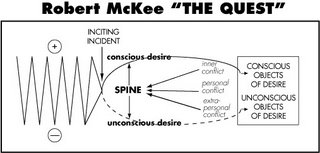The areas of his expertise
 The Clive Cussler trial apparently resumed this week after some time on hiatus. Doing a little paralegal work on the side for a local attorney leads me to conclude that even the court system is not immune from the casual ethos that pervades Los Angeles. On the East Coast, the case would have been over in a matter of weeks; here, it began in late January and is expected to last into May. Whatever, Your Honor.
The Clive Cussler trial apparently resumed this week after some time on hiatus. Doing a little paralegal work on the side for a local attorney leads me to conclude that even the court system is not immune from the casual ethos that pervades Los Angeles. On the East Coast, the case would have been over in a matter of weeks; here, it began in late January and is expected to last into May. Whatever, Your Honor.The fascinating development (at least screenwriters might find it fascinating, which is sad for us) to me was the producer's attorney calling Robert McKee as an expert witness. McKee, through his Story text and seminars, occupies a large (and polarizing) corner of the screenwriting universe. Some people swear by him, others just swear. Charlie Kaufman immortalized McKee by making him a character in Adaptation.
Philip Anschutz, the producer countersuing author Cussler for his share of the failure of the adaptation of "Sahara," called McKee to give his evaluation of Cussler's novel and screenplay version of the story. Anyone familiar with McKee's style can guess what the testimony was. Quoted in the LA Times on a 2002 draft of Cussler's script:
"The writing is very bad," he testified. "How bad? I have thought of phrases like 'seriously flawed' [or] 'fatally flawed.' But it is beyond all of that, because when something is flawed there is an implication that something else about it is good."
Ouch. Although, on cross-examination, Cussler's attorney, Bert Fields, got McKee to admit that he found Citizen Kane was "heartless," "emotionally empty" and "cold." Which I think was Welles's point about Kane's life but . . . okay. And while, as Fields notes, "McKee has been trying for 20 years to get a dozen screenplays made into a motion picture and he has never been successful," the $500/hour rate for his testimony ($60,000 total, or about what he makes for a single Story seminar) should make up somewhat for the industry's slight.
The New Yorker has an interesting feature on McKee from 2003 on their website.
